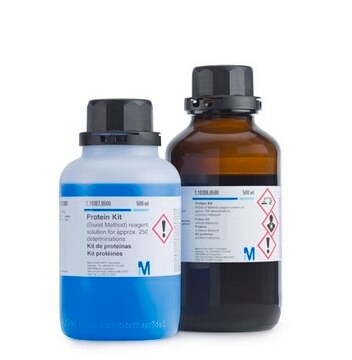T1949
Total Protein Reagent
Synonym(s):
Biuret Reagent
Sign Into View Organizational & Contract Pricing
All Photos(1)
About This Item
UNSPSC Code:
12352202
NACRES:
NC.07
Recommended Products
Quality Level
Application
Total Protein Reagent can be used for the quantitative, colorimetric determination of total protein concentration in solution at 540 nm. The total protein reagent is supplied as a ready-to-use liquid.
Total Protein Reagent has been used in the biuret assay.
Biochem/physiol Actions
A biuret-based total protein reagent. Copper ions in the alkaline reagent react with peptide bonds in proteins resulting in a purple color with an absorbance maximum of 540 nm.
Signal Word
Danger
Hazard Statements
Precautionary Statements
Hazard Classifications
Aquatic Chronic 2 - Eye Dam. 1 - Met. Corr. 1 - Skin Corr. 1B
Storage Class Code
8B - Non-combustible corrosive hazardous materials
WGK
WGK 2
Flash Point(F)
Not applicable
Flash Point(C)
Not applicable
Personal Protective Equipment
dust mask type N95 (US), Eyeshields, Gloves
Choose from one of the most recent versions:
Certificates of Analysis (COA)
Lot/Batch Number
Don't see the Right Version?
If you require a particular version, you can look up a specific certificate by the Lot or Batch number.
Already Own This Product?
Find documentation for the products that you have recently purchased in the Document Library.
Determination of serum proteins by means of the biuret reagent.
Gornall, A. G., et al.,
The Journal of Biological Chemistry, 177, 759-759 (1949)
Chad L Seewagen et al.
Conservation physiology, 8(1), coaa037-coaa037 (2020-05-12)
Non-native, invasive plants can impact birds by altering food sources, nesting substrates and other critical resources. Japanese barberry (Berberis thunbergii) is one of the most invasive, non-native woody plants in in the northeastern USA, and yet almost nothing is known
Does Exurban Housing Development Affect the Physiological Condition of Forest-Breeding Songbirds? A Case Study of Ovenbirds (Seiurus aurocapillus) in the Largest Protected Area in the Contiguous United States.
Seewagen CL
Physiological and Biochemical Zoology : Pbz, 88, 416-424 (2015)
Stefano Cecchini et al.
Animals : an open access journal from MDPI, 10(11) (2020-11-07)
Total antioxidant capacity (TAC) in healthy and dexamethasone-stressed hens was measured by applying four different spectrophotometric methods-the ferric reducing ability (FRAP) assay, the 2,2'-azino-bis (3-ethylbenzotiazoline-6-sulphonic acid) (ABTS) radical cation decolorization assay, the free radical scavenging activity (FRSA), and the total
Systematic comparisons of various spectrophotometric and colorimetric methods to measure concentrations of protein, peptide and amino acid: detectable limits, linear dynamic ranges, interferences, practicality and unit costs.
Chutipongtanate S
Talanta, 98, 123-123 (2012)
Our team of scientists has experience in all areas of research including Life Science, Material Science, Chemical Synthesis, Chromatography, Analytical and many others.
Contact Technical Service









